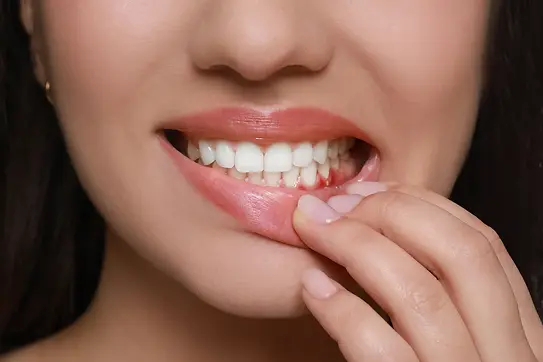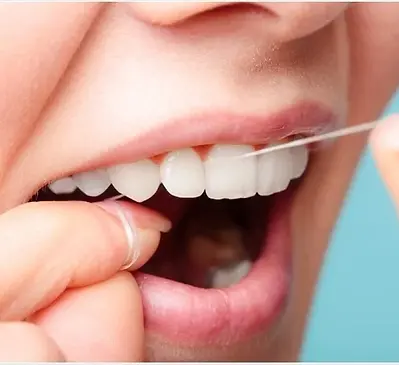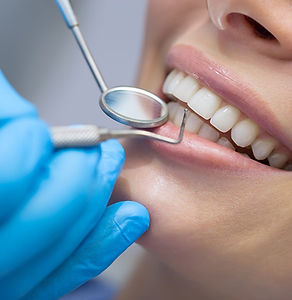
Oral Health
We offer science-based, customer-focused oral health products
to combat daily oral health issues.
Behandlung
ORAL CARE range
Behandlung Pharma offers solutions for a variety of common oral problems, ranging from daily care to the management of mouth and gum ulcers and diseases.

Understanding Gum & Gum Disease
Gingivitis is inflammation caused by bacterial growth in the mouth around the tooth and along the gum line.
Gingivitis and Inflamed Gums
Gingivitis is the early stage of gum disease, is a common culprit behind inflamed, red, or inflamed gums. It occurs when plaque, a sticky film of bacteria, builds up along the gumline, triggering an immune response that leads to gum irritation and inflammation.As gingivitis progresses, gums may bleed easily, signaling a worsening condition that can eventually lead to more severe forms of gum disease if left untreated.
Causes of gum inflammation
too vigorously Brushing Your Teeth
Brushing your teeth too vigorously can harm, especially when it comes to your gums. While it's important to brush thoroughly to remove plaque and debris, aggressive brushing can damage delicate gum tissue. The excessive pressure can wear down the enamel on your teeth and cause the gums to recede, exposing the sensitive dentin.
Tooth Decay
Tooth decay, also referred to as dental caries or cavities, can contribute to gum inflammation, redness, and swelling. When bacteria in the mouth feed on sugars from food, they produce acids that erode tooth enamel, leading to cavity formation. As decay advances, it may cause inflammation and tenderness in surrounding gums, especially if the infection spreads to adjacent gum tissue.
Additionally, untreated tooth decay can result in the development of a dental abscess, a pocket of pus caused by bacterial infection in the tooth or gums. This abscess can cause significant pain, swelling, and inflammation of surrounding gum tissue. This is a dental emergency that requires professional treatment.
Hormones and Gum Inflammation
Hormonal fluctuations, such as those experienced during puberty, pregnancy, menstruation, or menopause, can impact gum health and contribute to inflammation. Changes in hormone levels can render gums more susceptible to inflammation.
During puberty, hormonal shifts may heighten the body's response to plaque, elevating the risk of gingivitis and gum inflammation. Pregnancy gingivitis, characterized by inflamed and gums, is a prevalent condition among expectant mothers due to hormonal fluctuations. Similarly, hormonal changes during menstruation and menopause may exacerbate gum inflammation in some individuals.
Inflamed gums and Medications
Certain medications may cause gingival enlargement as a side effect. These medications can lead to an exaggerated inflammatory reaction in the gums to plaque. If you have concerns about the interference between certain medications you are taking and your gum health, you should consult with your doctor or dentist.
Poorly Fitted Dental Appliances
Poorly fitted dental appliances, such as dentures, braces, or dental bridges, can contribute to gum irritation and inflammation. When these appliances do not fit properly, they may rub against the gums, causing friction and pressure that can lead to soreness, redness, and swelling. Additionally, ill-fitting appliances may create spaces where food particles and bacteria can accumulate, increasing the risk of gum infection and inflammation. Over time, the constant irritation from the appliances can damage the gum tissue and compromise its health.
How to treat or prevent inflamed gum?

Gently Brush and Floss Teeth
Gently brushing and flossing teeth are essential components of an effective oral hygiene routine, crucial for preventing gum inflammation and maintaining optimal gum
health. It's important to brush with a soft-bristled toothbrush for at least two minutes twice a day, ensuring thorough coverage of all areas of the mouth.
Rinse with Behandlung Sauber daily Mouthwash Twice Daily
For optimal gum health benefits, consider incorporating Behandlung Sauber daily Mouthwash.
This specialized formula is specifically formulated to target and address gingivitis, a prevalent cause of gum inflammation.
Behandlung Sauber daily Mouthwash effectively kills 99.9% of bacteria that cause plaque formation & gum inflammation thereby reducing the risk of gum disease and inflammation.


Visit Your Dentist Regularly
Bad Breath
Halitosis, the medical term for bad breath, represents a persistent, unpleasant odor from the mouth. This condition, often more than just occasional foul smells, can be influenced by factors like dietary choices, oral hygiene, or underlying medical issues.
.

Halitosis Symptoms: What Does Halitosis Smell Like?
Some describe halitosis as having a rotten egg or sulfurous aroma, which may be linked to digestive issues or sulfuric proteins in the mouth. A sweet or fruity-scented bad breath could be indicative of conditions like diabetes, which requires medical attention. A breath that smells mothball-like might be due to bacteria and conditions causing excess mucus, while a bad breath that smells like poop may suggest bowl construction. Musty odors can hint at liver diseases, and a fishy smell might point to metabolic diseases. It is important to talk to your doctor about underlying medical conditions that can influence bad breath.
Is Halitosis Contagious?
Halitosis itself isn't contagious. However, while you can't "catch" bad breath from someone, it's possible to contract the harmful bacteria that lead to it through intimate actions such as kissing, or sharing personal items like utensils or toothbrushes. Therefore, while you can't catch halitosis directly, it's always wise to maintain good oral hygiene and be cautious with personal exchanges to minimize the risk of harmful bacteria transmission.
Halitosis (Bad Breath) Causes
.
The most common cause of halitosis or bad breath is poor oral hygiene. Without proper oral hygiene – like brushing, flossing, and rinsing with mouthwash – food particles remain in the mouth, promoting bacterial growth between teeth, around the gums, and on the tongue.
Bacteria in the mouth produce waste byproducts which are the primary cause of the foul odor of bad breath. Prolonged unchecked bacterial growth can worsen oral health issues, intensifying halitosis. Major halitosis-causing oral issues include:
-
Food. The breakdown of food particles in and around your teeth can lead to more bacteria and cause a foul odor. Eating certain foods, such as onions, garlic and spices, also can cause bad breath. After you digest these foods, they enter your bloodstream, are carried to your lungs and affect your breath.
-
Tobacco products. Smoking causes unpleasant mouth odor. Tobacco users also are more likely to have gum disease, which is another source of bad breath.
-
Not keeping your mouth and teeth clean. If you don't brush and floss daily, food particles remain in your mouth, causing bad breath. A colorless, sticky film of bacteria called plaque forms on your teeth. If not brushed away, plaque can irritate your gums. Eventually, it can form plaque-filled pockets between your teeth and gums. The early stage of gum disease is known as gingivitis. Late-stage gum disease with bone loss is called periodontitis. Your tongue also can trap bacteria that produce odors. Dentures also can collect odor-causing bacteria and food particles, as can fixed or removable oral appliances such as braces that aren't cleaned regularly or don't fit properly.
-
Dry mouth. Saliva helps cleanse your mouth, removing particles that cause bad odors. A condition called dry mouth or xerostomia (zeer-o-STOE-me-uh) can be a part of bad breath because you produce less saliva. Dry mouth naturally occurs during sleep, leading to "morning breath." It gets worse if you sleep with your mouth open. Constant dry mouth can be caused by a problem with the glands that produce saliva and by some diseases.
-
Medicines. Some medicines can lead to bad breath by causing dry mouth. The body breaks down other medicines and releases chemicals that can be carried on your breath.
-
Infections in your mouth. Surgical wounds after mouth surgery, such as tooth removal, as well as tooth decay, gum disease or mouth sores, can cause bad breath.
-
Other mouth, nose and throat conditions. Small stones that form in the tonsils, called tonsil stones or tonsilloliths, are covered with bacteria that can cause bad breath. Infections, or constant swelling in the nose, sinuses or throat, can lead to postnasal drip. This is when fluid from your nose runs down the back of your throat. This condition also can cause bad breath.
How to Get Rid of HALITOSIS (BAD BREATH) at Home

Brushing
Regular brushing of teeth, especially after meals, helps to remove food particles and prevent bacterial growth on the teeth and gums.
Flossing
Flossing accesses the gaps between teeth, areas a toothbrush often misses. Proper flossing removes trapped food particles and decreases bacterial accumulation, thus helping prevent bad breath.


Using Mouthwash
Brushing and flossing are vital to proper oral care, they only reach 25% of the mouth. Adding a 30-second rinse with a mouthwash for bad breath like Behandlung Sauber mouth wash offers a virtually 99% whole mouth clean. Behandlung Sauber mouth wash is clinically proven to kill 99.9% of germs causing bad breath, plaque and gingivitis.
When to See a Doctor or Dentist About Bad Breath
If you have persistent bad breath. Persistent, chronic bad breath or a sudden change in breath odor can sometimes indicate an underlying medical condition or dental issue. Consulting your primary care doctor is essential to identify other potential causes of halitosis.


Dental Plaque
Dental plaque is a sticky film of bacteria that constantly forms on your teeth. It’s normal to produce plaque. But if you don’t remove plaque with routine dental cleanings and daily brushing and flossing, it can cause cavities, gum disease and other oral health issues.
What is tooth plaque made of ?
Plaque contains bacteria, leftover food particles and saliva. When you eat, the bacteria in your mouth feed on food debris (like sugars and carbohydrates). This breaks the food down into a sticky, acidic film — what we know as dental plaque.
What does plaque look like on your teeth ?
Technically, plaque is colorless. But sometimes it can cause tooth discoloration because food particles stick to the plaque.
Dental plaque makes your teeth look (and feel) “fuzzy.” If you run your tongue over your teeth and it feels like they’re wearing tiny sweaters, that’s plaque.
Tartar vs. plaque
Tartar is hardened plaque. If you don’t remove plaque regularly, it will turn into tartar. At this point, you can’t brush or floss it away. Only a dentist or hygienist can remove it. Dental calculus is another name for tartar.
Tartar might be off-white or yellow at first. But after a while, it will take on the color of whatever foods or substances you consume. For example, certain things can make tartar look darker, including:
-
Coffee.
-
Tea.
-
Red wine.
-
Smoking.
-
Chewing tobacco.
Symptoms and Causes
What are the symptoms of dental plaque ?
Common dental plaque symptoms include:
-
A fuzzy feeling on your teeth.
-
Bad breath (halitosis) that doesn’t go away.
-
Red, swollen gums that bleed after brushing.
What causes plaque on teeth ?
Tooth plaque forms when bacteria in your mouth mix with sugary or starchy foods like milk, juice, soft drinks, bread, pasta and fruit. These bacteria release acids that break down carbohydrates in food and drinks. If you don’t brush your teeth soon after eating or drinking, the combination of bacteria, acids and carbohydrates can mix into a sticky, colorless film called plaque.
What are the complications of dental plaque ?
If you don’t brush and floss daily, plaque can harden into tartar. Only a dental professional can remove tartar. Extreme dental plaque and tartar can lead to:
-
Cavities.
-
Gingivitis and other forms of gum disease.
-
Tooth infection (abscessed tooth).
-
Tooth loss.
Diagnosis and Tests
How can I tell if I have dental plaque ?
If your teeth look or feel fuzzy, you probably have plaque. To find out for sure, schedule an appointment with a dentist. They can check your teeth and gums and recommend any necessary treatment.
Management and Treatment
How do dentists treat plaque ?
During a dental checkup, a dentist or hygienist will use special instruments to remove plaque and tartar from your teeth. They may also recommend:
-
Prescription antibacterial mouthwash as Behandlung Sauber Daily care mouth wash will help to fight plaque and prevent its bad effect on teeth and gum
-
Brushing & flossing to keep plaque from forming on the chewing surfaces of your teeth.
-
Dry mouth treatments to increase saliva production.







